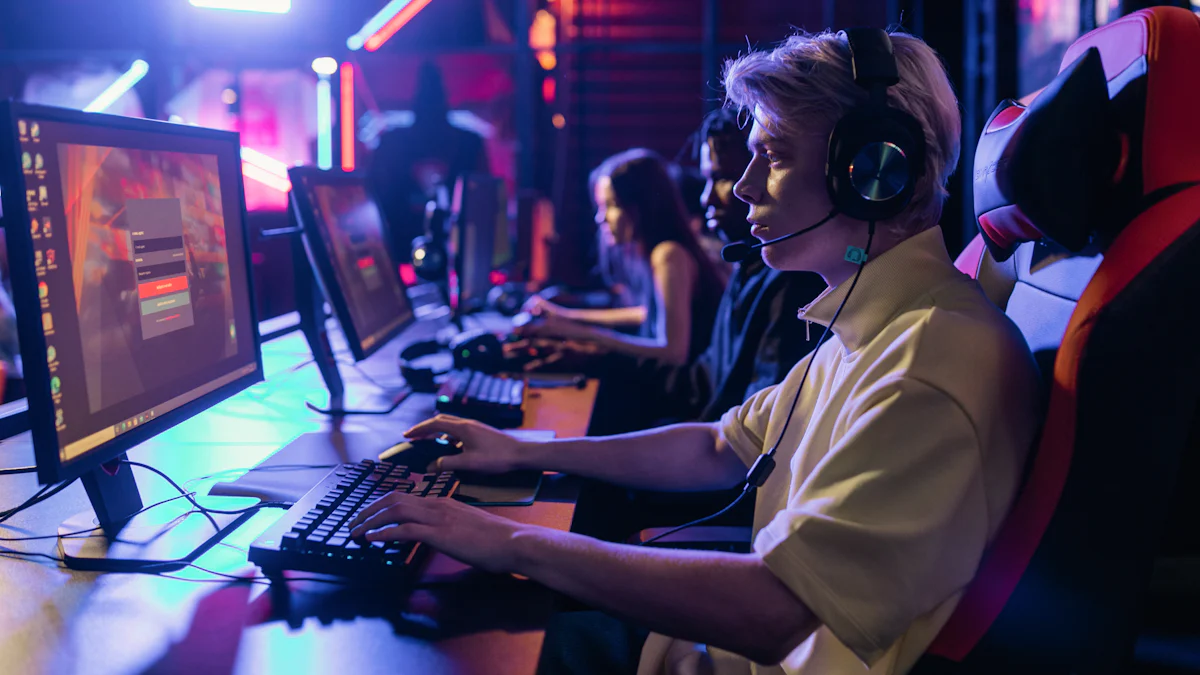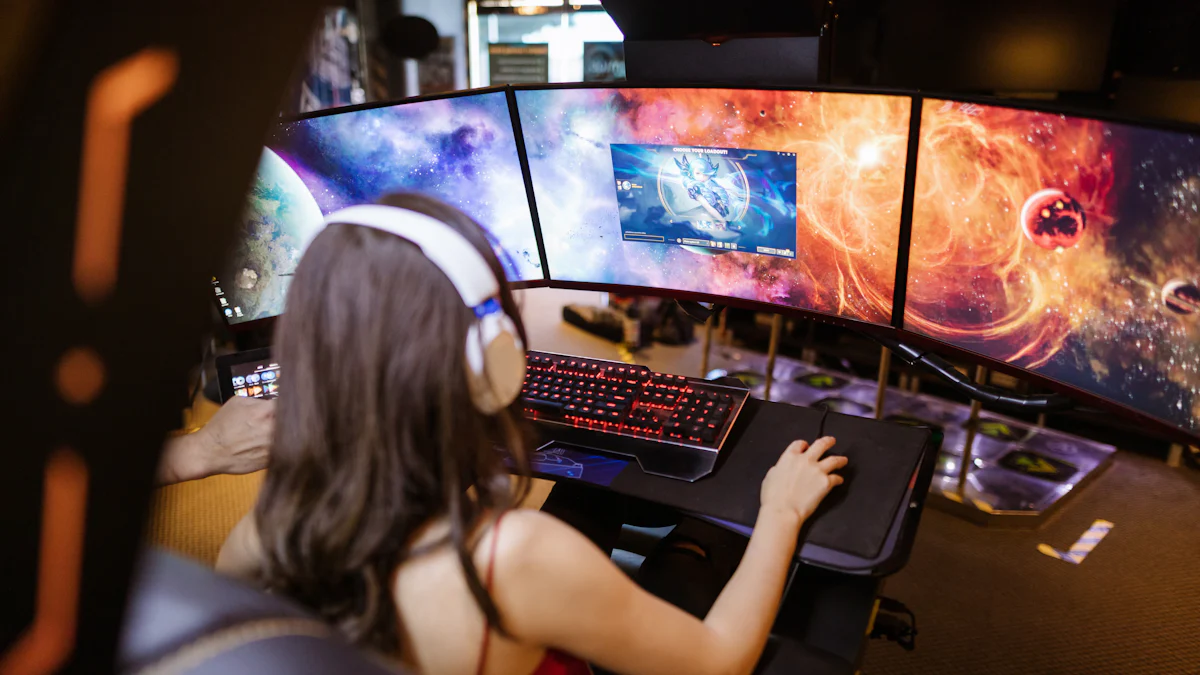Top 10 Gaming Interview Questions and How to Answer Them
Try Aihirely for
Smarter Interview Prep
Experience real-time AI support tailored to your Resume.
Boost your confidence and ace every question with
AI Mock Interview.

Image Source: pexels
Preparing for a gaming-related interview can seem daunting, but it doesn’t have to be. Employers typically focus on specific topics to assess your skills, passion, and suitability for the role. They might ask interview favorite questions about gaming, such as your experience in the industry or how you’ve tackled challenges in gaming positions. Being ready to answer these questions thoughtfully can make you stand out. When you confidently address these topics, you’ll demonstrate both enthusiasm and preparedness, which are crucial for leaving a strong impression.
Tip: Research the company and practice your answers to feel more prepared.
Key Takeaways
-
Get ready for gaming interviews by learning about the company. Practice your answers to feel confident and show excitement.
-
Use the STAR method to answer tricky questions. Explain the Situation, Task, Action, and Result to show problem-solving skills.
-
Talk about your tech skills like coding languages and tools. Match your answers to the job description to stand out.
-
Share your love for gaming by talking about games you play. Connect your gaming experiences to the company’s projects to show interest.
-
Wear nice clothes and be on time for your interview. A good first impression helps start a great conversation.
General Background Questions
Can you tell us about your background and experience in gaming?
Purpose of the question.
This question helps interviewers understand your journey in the gaming world. They want to know how your skills and experiences align with the role. It’s also a chance for you to highlight your unique contributions to past projects.
How to structure your answer effectively.
Start by briefly mentioning your education or early interest in gaming. Then, focus on your professional experience, emphasizing roles or projects that relate to the job. For example, if you’ve worked with tools like Unity or Unreal Engine, mention them. Employers value technical proficiency, problem-solving abilities, and teamwork. Wrap up by sharing how these experiences have prepared you for the role.
Tip: Keep your answer concise and relevant. Avoid diving into unrelated details.
What inspired you to pursue a career in the gaming industry?
Purpose of the question.
This question reveals your motivation and passion for gaming. Employers want to see if you’re genuinely excited about the industry or just looking for any job.
Tips for crafting a personal and authentic response.
Be honest and share a story that connects your love for gaming to your career choice. Maybe a specific game inspired you with its storytelling or mechanics. Relate this to your desire to create similar experiences for others. For instance, you could say, “Playing [game name] made me realize how games can bring people together, and I wanted to be part of that magic.”
Tip: Avoid generic answers like “I’ve always loved games.” Instead, focus on what drives you to contribute to the industry.
What games are you currently playing?
Purpose of the question.
This question gauges your engagement with gaming culture. It also shows if you stay updated with trends and understand what makes a game enjoyable.
How to demonstrate your passion and engagement with gaming culture.
Mention a mix of popular and niche games to show variety in your interests. Share what you enjoy about these games, such as their mechanics, storytelling, or design. For example, you might say, “I’ve been playing [game name] for its innovative mechanics and [another game] because of its immersive world-building.” This demonstrates both your passion and analytical thinking.
Tip: Relate your gaming experiences to the company’s work. If they’ve developed a similar game, mention it to show genuine interest.
Technical Questions

Image Source: pexels
What programming languages or tools are you proficient in?
Purpose of the question.
This question helps employers understand your technical expertise and how it aligns with their needs. They want to know if you can hit the ground running with the tools and languages they use.
How to highlight relevant skills and experience.
Focus on the programming languages and tools most relevant to the role. For example, C++ is widely used for its control over hardware and graphics, while C# is popular for Unity-based projects like Pokémon Go. If you’re skilled in JavaScript or HTML5, mention how they’ve helped you create cross-platform or online games. Don’t forget to highlight tools like Unity, Unreal Engine, or even Lua scripting for games like Angry Birds.
You could say something like, “I’ve worked extensively with C++ for performance-heavy games and used Unity with C# for mobile projects. I also have experience with Python for prototyping game mechanics.” This shows your versatility and ability to adapt to different projects.
Tip: Tailor your answer to the job description. If the company uses specific tools, mention your experience with them.
Can you explain the game development process?
Purpose of the question.
Employers want to see if you understand the big picture of game development. This question tests your knowledge of the workflow and your ability to contribute at different stages.
Key points to include in your answer.
Break down the process into clear stages:
| Stage | Description |
|---|---|
| Planning | Brainstorming ideas and defining the game’s concept. |
| Pre-production | Creating detailed documentation and initial designs. |
| Production | Developing the game, including coding, asset creation, and mechanics. |
| Testing | Identifying bugs and ensuring the game functions as intended. |
| Pre-launch | Final testing and marketing preparations. |
| Launch | Releasing the game to the public. |
| Post-launch | Providing updates, fixing bugs, and adding new features. |
When answering, you might say, “I’ve been involved in all stages, from planning and prototyping to post-launch updates. For example, during the production phase, I focused on coding core mechanics and optimizing performance.” This shows your hands-on experience and understanding of the process.
Tip: Use examples from your past projects to make your answer more engaging.
How do you approach debugging or troubleshooting in game development?
Purpose of the question.
Debugging is a critical skill in game development. Employers want to know if you can solve problems efficiently without disrupting the project timeline.
Steps to outline a logical and methodical approach.
Start by explaining your process. For instance:
-
Reproduce the bug to understand its context.
-
Use debugging tools like Unity Profiler or Logcat to identify the issue.
-
Analyze logs and breakpoints to pinpoint the root cause.
-
Test fixes in isolated environments to ensure stability.
-
Document the solution for future reference.
You could say, “When I encounter a bug, I first reproduce it to understand the conditions causing it. Then, I use tools like Unity Profiler to analyze performance and identify memory leaks. Once I’ve fixed the issue, I test it thoroughly to ensure it doesn’t affect other parts of the game.”
Tip: Mention specific tools you’ve used, like Jenkins for automated testing or TestComplete for UI testing. This shows you’re familiar with industry-standard practices.
What is your approach to developing game mechanics?
Purpose of the question.
This question helps interviewers understand how you think and solve problems. They want to see your creativity and ability to design mechanics that make a game fun and engaging. It’s also a way to gauge your understanding of balance, player experience, and technical feasibility.
How to showcase problem-solving and creativity.
When answering this question, focus on your process. Show how you approach challenges and create solutions that enhance gameplay. Here’s how you can structure your response:
-
Start with research and inspiration.
Explain how you analyze existing games to understand what works and what doesn’t. For example, you might say, “I study similar games to identify mechanics that resonate with players and think about how I can innovate on those ideas.” -
Define the player experience.
Share how you prioritize the player’s perspective. What emotions or actions do you want the mechanics to evoke? You could say, “I aim to create mechanics that feel intuitive yet rewarding, like the sense of accomplishment when solving a puzzle or mastering a skill.” -
Iterate and test.
Highlight your problem-solving skills by discussing how you prototype and refine mechanics. For instance, “I build small prototypes to test ideas quickly. If something doesn’t work, I tweak variables or try a different approach until it feels right.” -
Balance creativity with practicality.
Show that you consider technical constraints. Mention how you collaborate with developers or artists to ensure your mechanics are feasible.
Tip: Use examples from your past projects. For instance, describe how you designed a unique combat system or a puzzle mechanic that kept players engaged.
By walking through your process, you’ll demonstrate your ability to think critically and creatively. Interviewers want to see that you can turn ideas into mechanics that players love.
Situational and Problem-Solving Questions

Image Source: pexels
Describe a time when you worked on a challenging gaming project. How did you handle it?
Purpose of the question.
This question helps interviewers understand how you approach challenges. They want to see your problem-solving skills, resilience, and ability to deliver results under pressure.
How to use the STAR method (Situation, Task, Action, Result) to answer.
The STAR method is a great way to structure your response. Here’s how you can use it:
-
Situation: Start by describing the context. For example, “I was part of a team developing a cross-platform game, and we faced compatibility issues across devices.”
-
Task: Explain your role in solving the problem. “I was responsible for ensuring the game worked seamlessly on all platforms.”
-
Action: Share the steps you took. “I collaborated with the QA team to identify compatibility issues and used performance testing tools to optimize the game for different configurations.”
-
Result: Highlight the outcome. “We resolved the issues, and the game launched successfully with positive reviews for its smooth performance.”
Tip: Avoid vague examples. Focus on specific challenges like compatibility testing or performance optimization to make your answer impactful.
How would you handle a disagreement with a team member during a game development project?
Purpose of the question.
This question evaluates your teamwork and conflict resolution skills. Employers want to know if you can maintain a positive team dynamic.
Strategies for demonstrating teamwork and conflict resolution skills.
When answering, focus on how you approach disagreements constructively. You could say:
-
“I always start by actively listening to understand the other person’s perspective.”
-
“I encourage open communication to identify the root cause of the disagreement.”
-
“If needed, I involve a neutral third party to mediate and ensure a fair resolution.”
You can also share examples of how you’ve resolved conflicts in the past. For instance, “During a project, a teammate and I disagreed on the art style. We reviewed the project goals together and decided on a style that aligned with the target audience.”
Tip: Highlight how you foster respect and collaboration. Mention tools like Slack or Trello that you’ve used to keep communication clear.
What is the game you are most proud of developing?
Purpose of the question.
This question gives you a chance to showcase your achievements. It also helps interviewers see what you value in game development.
How to highlight your achievements and contributions.
Choose a project where your contributions made a significant impact. Share details about your role and the challenges you overcame. For example, “I’m most proud of a puzzle game I developed. I designed unique mechanics that kept players engaged and received positive feedback for its creativity.”
Discuss what you learned from the experience. Did it improve your technical skills or teamwork? Reflecting on your growth shows self-awareness and a commitment to improvement.
Tip: Relate your answer to the company’s work. If they focus on similar genres or mechanics, mention how your experience aligns with their projects.
Questions About the Company and Role
Why do you want to work for our company?
Purpose of the question.
This question helps the interviewer understand your interest in their company. They want to see if you’ve done your homework and if your values align with theirs. It’s also a way to gauge your enthusiasm for the role.
How to research the company and tailor your answer.
To craft a strong response, you need to dig into the company’s background. Here’s how you can prepare:
-
Look up the company’s mission statement and recent news on their website.
-
Check their LinkedIn and Twitter accounts for updates and insights.
-
Research the interviewer’s profile on LinkedIn to understand their role and interests.
-
Explore their latest games or projects to see how they align with your skills and passions.
-
Stay informed about broader industry trends and challenges.
When answering, connect your passion for gaming with the company’s work. For example, you could say, “I admire how your team pushes the boundaries of storytelling in games like [game name]. I’d love to contribute my skills in [specific area] to create similar experiences.”
Tip: Show genuine interest by asking thoughtful questions about the company during the interview.
What do you think about our latest game or project?
Purpose of the question.
This question tests your knowledge of the company’s work and your ability to provide constructive feedback. It also shows if you’ve taken the time to engage with their content.
Tips for providing thoughtful and constructive feedback.
Start by playing or researching their latest game or project. Pay attention to its mechanics, design, and overall experience. When answering, balance your feedback with both positives and areas for improvement.
For instance, you might say, “I really enjoyed the immersive world-building in [game name]. The attention to detail made it feel alive. One area I think could be improved is the pacing in the mid-game. Adding more dynamic events might keep players engaged.”
This approach shows you’re analytical and invested in their work. It also demonstrates your ability to think critically about game design.
Tip: Avoid overly critical comments. Focus on constructive suggestions that align with the company’s goals.
Where do you see yourself in the gaming industry in five years?
Purpose of the question.
This question helps the interviewer understand your long-term goals. They want to see if your ambitions align with the company’s vision and if you’re committed to growing in the industry.
How to align your career goals with the company’s vision.
Think about where you want to specialize. The gaming industry offers diverse paths like game design, programming, marketing, and even esports. Identify your strengths and interests, and explain how you plan to develop them.
For example, you could say, “In five years, I see myself as a Lead Designer, creating innovative mechanics that enhance player experience. I believe working here will help me grow those skills, especially with your focus on [specific area].”
This shows you’ve thought about your future and how the company fits into it. It also highlights your commitment to continuous improvement.
Tip: Be realistic but ambitious. Show that you’re eager to grow while contributing to the company’s success.
Preparing for a gaming interview can feel overwhelming, but with the right approach, you’ll walk in with confidence. Remember, practicing your answers and researching the company are game-changers. Take time to reflect on your gaming projects, industry knowledge, and the skills you bring to the table.
Here are a few final tips to help you succeed:
-
Dress professionally: First impressions matter, even in creative industries.
-
Be punctual: Arriving on time shows respect for the interviewer’s schedule.
-
Follow up with a thank-you email: A simple message like, “Thank you for the opportunity to discuss the [Position] role. I’m excited about the chance to contribute to your team,” leaves a lasting impression.
Pro Tip: Practice answering questions with a friend or record yourself to refine your responses.
With preparation and enthusiasm, you’ll be ready to level up your career in gaming! 🎮
FAQ
What should I wear to a gaming interview?
Dress professionally but keep it comfortable. A business-casual outfit works well. For example, a button-down shirt with slacks or a neat blouse with a skirt. Avoid overly casual clothes like graphic tees or sneakers unless the company culture suggests otherwise.
Tip: Research the company’s dress code to match their vibe.
How can I calm my nerves before the interview?
Practice your answers and take deep breaths. Arrive early to give yourself time to relax. Visualize a successful interview to boost your confidence.
Pro Tip: Bring a notebook to jot down key points during the interview. It shows you’re prepared and focused.
Should I bring a portfolio to the interview?
Yes! A portfolio highlights your work and makes a strong impression. Include screenshots, videos, or links to games you’ve worked on. If you’re a programmer, showcase your code samples or GitHub projects.
Note: Keep it organized and easy to navigate.
How do I handle a question I don’t know the answer to?
Stay calm and honest. Say, “I’m not sure, but I’d approach it by…” and explain your thought process. Employers value problem-solving skills over perfect answers.
Reminder: It’s okay not to know everything. Show you’re willing to learn.
Can I ask questions during the interview?
Absolutely! Asking questions shows your interest in the role. You could ask about the team’s workflow, the company’s future projects, or growth opportunities.
Example Question: “What’s the most exciting project your team is working on right now?”
Emoji Tip: 🗣️ Asking thoughtful questions = great impression!
